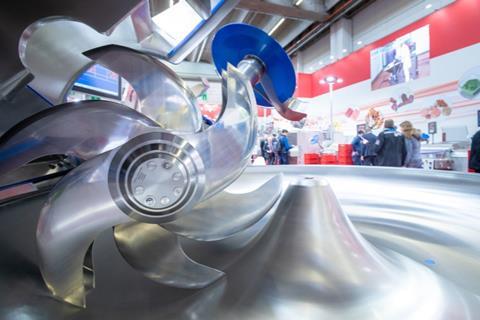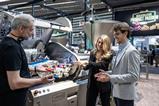Sustainability is a catalyst for change and innovation in the meat industry. The industry is responding with technological innovations, but also with fundamental corporate commitments to sustainable solutions.

From 14th–19th May 2022, IFFA, the Leading International Trade Fair – Technology for Meat and Alternative Proteins, will open its doors in Frankfurt am Main. Internationally renowned companies will present their latest technologies and provide information on the most important trends and developments in the meat and protein processing industry.
The discussion about sustainable production in the meat processing industry essentially concerns issues of environmental protection, health and animal welfare. In connection with climate protection, the high carbon dioxide (CO2) emissions, the equally high water consumption and the packaging waste produced, which consists mainly of plastic packaging, are the focus of criticism.
The influence of meat consumption on the greenhouse effect is undisputed. In Germany alone, 42.7 million tons of CO2 per year are attributable to meat consumption, in addition to water consumption of 60 trillion litres. The average water footprint per calorie is particularly high for beef, about twenty times higher than for cereals. It is estimated that switching to a diet, low in meat, could result in water savings of 11-35%.
More and more consumers are questioning their dietary behaviour. Around one third of Europeans buy and eat less meat, and 16% take the carbon footprint of their food into account when shopping and adjust their purchases accordingly. Meat substitutes are experiencing a real boom. IFFA 2022 picks up this trend and will open up to alternative protein sources. In addition to its focus on meat, the trade show will present processing technologies and ingredients for plant-based proteins for the first time.
New trends in machinery: resource and energy management
The meat processing industry is a high energy-intensive sector. Heating and cooling food requires large amounts of energy. Cold is needed to chill meat to ensure food safety, heat is needed for cooking, steaming, simmering, sterilization and cleaning. In addition, there is water consumption for cleaning and disinfecting manufacturing facilities.
Energy-efficient refrigeration and heat pump solutions can improve energy efficiency in heating and cooling by up to 70%. Waste heat, which would otherwise be wasted, is reused and diverted to other processes such as water and brine heating, drying, cooking, blanching, pickling, pasteurizing, sterilizing, dehydrating and cleaning.
Savings can also be achieved through modern drive technology, such as servo motors. Energy-efficient, frequency-controlled drives achieve energy savings of up to 25%, and switch-on or switch-over current peaks are reduced.
Another step towards sustainability are machines with durable components and modern hygienic design, such as welded and rounded edges and recessed flush covers.

Packaging trends: more than just a cover
When it comes to packaging, many consumers no longer reach straight for the shelves, but instead pay attention to sustainable, environmentally friendly solutions. Accordingly, plastic-free and plastic-reduced packaging is a sustainable trend in packaging technology.
However, sustainability often counteracts food protection. This is because paper composites or recycled content allow more oxygen to penetrate, which can impair product quality. This can be remedied by oxygen absorbers, for example based on polymers, which bind the residual oxygen in the packaging and the penetrating oxygen, and whose functional layer is integrated in the multilayer structure.
Research is also focusing on renewable raw materials. Algae-based plastics, transparent films made from hemp or cardboard made from grass: bio-based packing provides an alternative to plastic made from fossil raw materials.
Another trend is smart packaging that actively takes care of the meat product, protects it and thus has a sustainable effect. It keeps temperatures stable, absorbs unwanted ripening gases and prevents germ infestation. This way, not only low-emission technologies and processes, but also material-saving, recyclable and smart packaging will contribute to climate-neutral production.


















